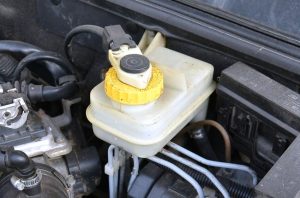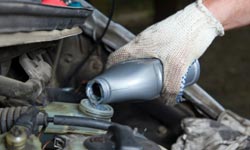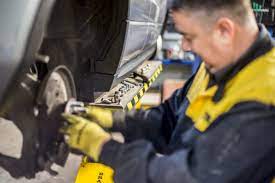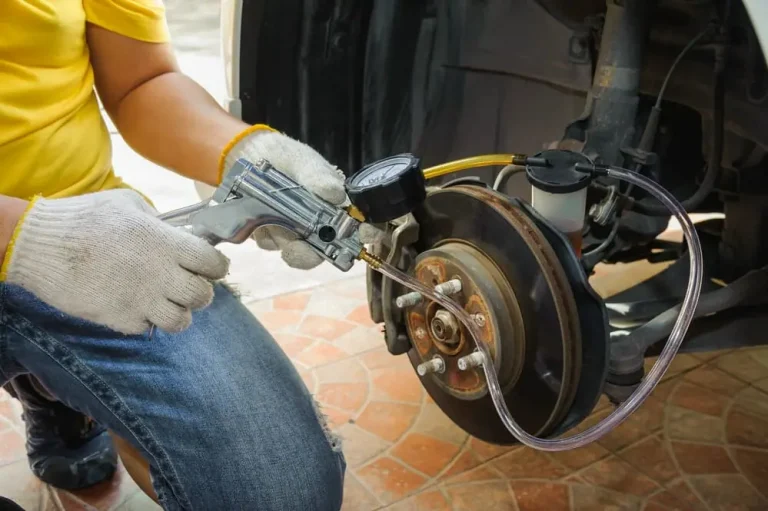The safety superheroes of an automobile are the brakes. They aid in stopping and keeping us safe while travelling. But sometimes, they too require a little assistance. Imagine you’re trying to bleed your brakes to improve their performance, but nothing comes out of the valve! It’s a precarious scenario. We’re going to be your go-to resource for fixing brake problems in this article. We’ll clarify the cause of this issue while bleeding brakes as well as, more crucially, how to resolve it.
We’ll break it down into simple steps so you can comprehend and approach this challenge with confidence; there’s no need for fancy phrases or difficult terminology here. So let’s jump in and unravel the mystery together if you’ve ever questioned why no fluid coming out when bleeding brakes on your automobile. Let’s get started!
Table of Contents
Importance Of Bleeding The Brake In Your Car
Think about having to abruptly stop while driving down a steep hill. To keep you safe, your brakes need to function flawlessly. In this case, brake bleeding is necessary. Giving your car’s brakes a breath of fresh air is what brake bleeding resembles. As air enters the brake system over time, your brakes become softer and less efficient. This poses a serious issue since it could prevent your car from stopping as quickly as it should.

By bleeding the brakes, this sneaky air is removed and replaced with new brake fluid. It’s comparable to making sure your brakes are working at their best. Your car should stop smoothly and safely when you push the brake pedal; it should react immediately. Bleeding your brakes is a safety superhero act rather than just a car maintenance task. It guarantees that your brakes are in excellent condition and prepared to keep you and other drivers safe. To maintain the finest possible braking performance in your car, don’t forget to do it frequently!
Reasons Why No Fluid Coming Out When Bleeding Brakes In Car?
It can be distressing to discover that no fluid is erupting when you are bleeding the brakes on your car to keep them in good condition. Understanding the causes is essential to effectively resolve the problem, as there are numerous potential explanations for this problem.
1. Empty Brake Fluid Reservoir:
The fluid that powers your brakes is kept in the brake fluid reservoir. There won’t be any blood to bleed if it’s empty. This may occur if you neglect to inspect and refuel it frequently or if the brake system has a leak.

2. Brake Lines With Air In Them:
Brakes are at the mercy of air. It can make the brake pedal feel spongy and less sensitive when it seeps into the brake lines. A worn-out brake master cylinder, a loose connection between the brake lines, or improper bleeding from previous brake maintenance can all cause air to enter the lines.
3. Blockage Of Brake Lines:
Brake lines may occasionally become clogged with debris or rust. This obstruction limits the passage of brake fluid, resulting in a dry brake during bleeding. Due to moisture in the braking fluid or if you neglect routine brake maintenance, blockages can develop over time.

4. Incorrect Brake Master Cylinder:
The master cylinder for your car’s brakes serves as its beating heart. It can restrict braking fluid from getting to the callipers or wheel cylinders if it isn’t functioning properly. This may cause a lack of fluid while bleeding.
5. Brake System Leak:
Anywhere in the brake system, from the brake lines and hoses to the callipers or wheel cylinders, brake fluid leaks can happen. If there is a leak, brake fluid is leaking out before it reaches the bleeding point, which results in a lack of fluid while bleeding.

6. Inappropriate Bleeding Method:
Sometimes, the manner the braking system is being bled rather than the brake system itself is the issue. Lack of fluid flow can be caused by improper bleeding methods or by not bleeding in the proper sequence.
7. Infected Brake Fluid:
The performance of the brake system may be impacted if your brake fluid has grown contaminated with water or other things. Fluid contamination can cause problems like vapour lock, which can prevent fluid from flowing during bleeding.

Therefore, it’s critical to take into account these possible causes if you experience the frustrating issue of no fluid coming out when bleeding brakes on your car.
How To Fix The Issue Of Bleeding Brakes In Your Car?
It can be irritating to bleed the brakes on your automobile and have no fluid come out. But don’t worry; we have fixes for this issue that will guarantee your brakes perform flawlessly.
1. Check The Reservoir For The Brake Fluid:
Open the hood of your automobile and look for the brake fluid reservoir before you begin. Usually, it’s close to the brake master cylinder. Verify the liquid level. You’ll need to add more brake fluid if it’s below the suggested amount. Use only the brand of brake fluid that is advised in your car’s owner’s handbook.

2. Correctly Bleed Brakes:
Starting with the wheel that is farthest from the master cylinder, begin bleeding the brakes and work your way to the one that is closest. You’ll require assistance with this. Have a helper pump the brake pedal as you open and close the bleeder valve as you attach a bleeding kit to the brake calliper or wheel cylinder. Follow your vehicle’s recommended bleeding procedure exactly.
3. Employ The Proper Tools:
Make sure you have the appropriate equipment. It’s crucial to have a brake bleeding kit, a wrench, and a container to catch the used brake fluid. The procedure is easier and more productive when the proper equipment is used.

4. Find Air Bubbles:
Watch the brake fluid flowing out of the bleeder valve carefully. There may still be air in the brake lines if you notice air bubbles in the fluid. Bleed until you observe a constant, bubble-free stream of clear brake fluid.
5. Look For Leaks:
If the reservoir has been examined, the brakes have been properly bled, and still no fluid is coming out, there may be a brake fluid leak somewhere in the system. Look for any leaks in the braking lines, connectors, and master cylinder. It’s critical to fix or replace the harmed component if you discover a leak.

6. Remove Obstacles:
The movement of braking fluid can occasionally be halted by obstructions in the brake lines. Look for kinks, rust, or debris in the brake lines. If you come into an obstruction, carefully remove it to get the fluid flowing again. It’s essential to seek advice from a qualified mechanic if you’re unclear on how to do this.
7. Look For Expert Assistance:
It’s time to seek the advice of a qualified mechanic if you’ve attempted these techniques and still aren’t able to get brake fluid to leak during bleeding. Your brake system may be experiencing more complicated problems that call for professional analysis and repair.

Therefore, it’s crucial to act quickly to fix the issue when you encounter no fluid coming out when bleeding brakes on your car. Maintaining the best possible condition of your car’s brakes is essential for your safety when driving.
What Is The Repairing Cost To Fix This Issue?
The cost to address this problem can differ. It might not be too expensive, maybe $50 to $100 for expert assistance, if the cure is a straightforward one like topping off the braking fluid or releasing air from the lines. However, the cost may rise dramatically if the issue is brought on by broken brake lines or other parts.

Replacement brake lines can cost between $100 and $300 per line, and a new brake master cylinder can cost between $300 and $600, components and labour included. To save money on repairs and guarantee your car’s safety on the road, it’s critical to identify and address brake issues as soon as possible. Always seek the advice of a reliable mechanic for a precise estimate based on the individual requirements of your vehicle.
Conclusion:
For your safety on the road, it’s essential that your car’s brakes perform smoothly. Don’t freak out if no fluid coming out when bleeding brakes of your car. Start by inspecting and, if necessary, replenishing the brake fluid reservoir. After that, thoroughly bleed the brake lines to get rid of any air. Inspect the lines and make any necessary clearings if you detect blockages.
To make sure your brakes are in top functioning condition, always see a professional mechanic if you’re hesitant or uncomfortable performing these operations. For traveller piece of mind, routine brake maintenance is a minor amount to pay. Additionally, address your queries related to the topic to us in the below comment section. Thank you for reading!
